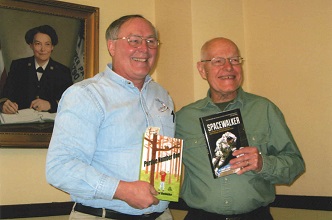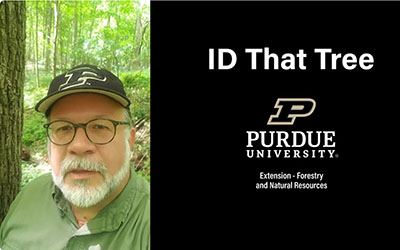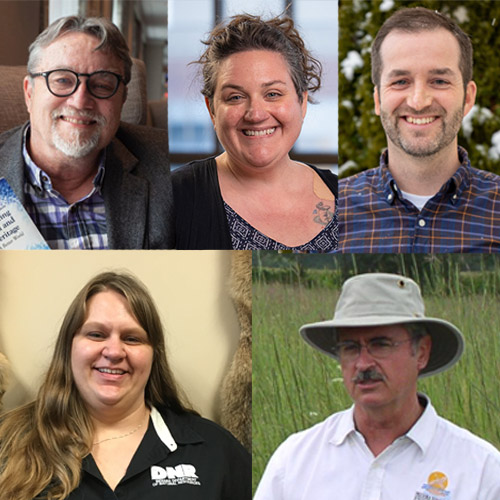FNR Remembers Professor Emeritus Walt Beineke
Dr. Walt Beineke, a 1960 forestry alumnus and a faculty member for more than 30 years, passed away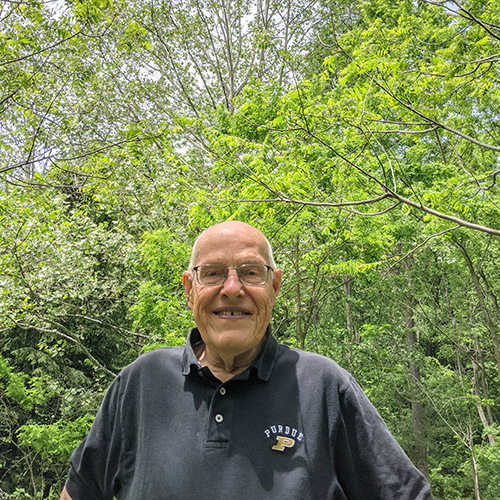 on Jan. 13.
on Jan. 13.
Beineke came to Purdue in 1956 and earned his bachelor’s degree, before going on to receive his master’s degree in silviculture from Duke University and a PhD in forest genetics from North Carolina State University.
In 1964, Beineke returned to West Lafayette and joined the faculty in the Department of Forestry and Natural Resources, specializing in forest genetics. He received many awards including outstanding teacher (7 times; 1972, 1973, 1986, 1988, 1992, 1997, 1998) and outstanding advisor (twice; 1990, 1997) in Purdue FNR. Beineke taught dendrology, applied forest tree improvement, and world forestry and society. He retired in 1998 and was named professor emeritus.
“I think I was born with an interest in trees,” Beineke said in an interview in 2020. “Even at five years old I was planting acorns in my mom’s flowerbeds, which did not make her very happy. And then my father planted a tree in the backyard that he dug up from the bushes in the front and he was sure it was an oak tree. That’s where my interest in tree identification came from because I was sure it was not an oak tree and that it was really a silver maple. I got books from the library on tree identification to prove to him that it was not an oak tree. Then as a Boy Scout I was involved with teaching summer camp courses for conservation and forestry merit badges. It was just natural to go to Purdue and major in forestry.”
Beineke worked on the genetic improvement of black walnut for timber purposes for over 40 years with emphasis on vegetative propagation, superior tree selection, progeny testing, seed orchard establishment, control pollination techniques and plantation management.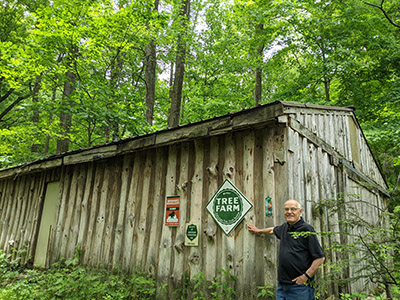
Beineke received the American Black Walnut Research Award in 1985 presented by the Walnut Council for “outstanding accomplishments in the development of practical procedures and improved techniques in the growing of American black walnut trees for the future.”
He authored more than 100 papers and book chapters on walnut genetics and management and was the holder of patents on 21 black walnut trees, nine with Purdue University (the first trees ever patented for timber purposes) and 14 with Arbor America (the first timber trees patented partially on the basis of DNA fingerprinting with the help of HTIRC at Purdue). He also held the first patents on black cherry and white oak, one each with ArborAmerica. Over 4,000 acres of patented black walnut are planted worldwide.
Beineke published the book, Purdue Number One, in 2010 about the discovery, reproduction, patenting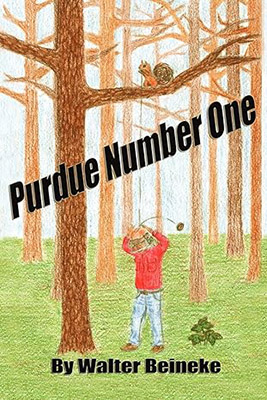 and marketing of Purdue #1, the first tree patented for timber uses and the philosophy behind it. He also wrote an extension publication on the Characteristics of Purdue University’s Patented Black Walnut trees, available in the Purdue Extension store.
and marketing of Purdue #1, the first tree patented for timber uses and the philosophy behind it. He also wrote an extension publication on the Characteristics of Purdue University’s Patented Black Walnut trees, available in the Purdue Extension store.
Beineke was a charter member of The Walnut Council. He also was a member of the Society of American Foresters, the National Woodland Owners Association, American Tree Farm Association, The Nature Conservancy and NICHES Land Trust. He served as director of research at Arbor America from 1999 until his passing.
After his retirement, Beineke consulted for industry and private land owners on growing and managing tree plantations.
In addition to his academic and research prowess, Beineke was a vital part of the Space Trees Project alongside astronaut Jerry Ross. Ross took four packets of sycamore, sweet gum and tulip poplar seeds to space on his 1988 mission (STS-27) aboard the Space Shuttle Atlantis. Upon his return, Beineke cared for the seeds over the next year and a half and in the spring of 1900, the pair set off on a journey through the state, planting space sycamores. In 2020, the 30th anniversary of the plantings, Purdue Extension’s Kristi Whitacre and Daniel Walker created an interactive story map of the remaining trees. The Allen County Extension office also shared a story about “The Tree from Space at Fox Island” in 2020. The space sycamore that remains on the Purdue campus is part of the Space Walks gold tour.
“It is a great sense of accomplishment to have space trees planted around the state that I had a small hand in,” Beineke said. “Jerry was the one that had to go into space with all of those dangers and unknowns, I just sat on the ground and planted seeds. But, probably the best part of it was the honor of getting to know and spend time with Jerry and his family.”
Beineke is the namesake of the Walter Beineke scholarship, created by Graham Richardson (BS 1969) in 2016. Distributions from the endowment support one or more annual undergraduate scholarships for out-of-state students enrolled in the College of Agriculture who have demonstrated academic merit and/or financial need. Preference is given to students enrolled in the Department of Forestry and Natural Resources.
"In my after-graduation years whenever I visited him, I would stand to the side of the doorway, and loudly pronounce "Liquidambar styraciflua Hamamelidaceae" the scientific name for the sweet gum tree," Richardson recalled. "He would laugh loudly, I would then enter, and we would have long, good talks. I did a variation of this even in recent years when I visited him as he was long retired...whether we sat inside his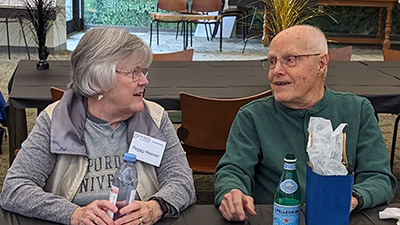 house or while we walked around his back yard above the west side of the Wabash River Valley.
house or while we walked around his back yard above the west side of the Wabash River Valley.
"My start of the Beineke Scholarship was unplanned. Eric Putnam (then the Development Officer I dealt with) called me about a matching funds situation, but it did not apply to my previously established funds, so I decided to start a fund to honor Dr. Beineke while he was still living. He donated additional monies to my start and some others may have added as well...that's how his fund got where it is today."
Beineke also ensured that his legacy would continue after his passing through his personal property of 15 acres, which will become part of the Niches Land Trust.
A full obituary for Dr. Beineke is available online.
What They Are Saying About Dr. Walt Beineke
Chad Evans, WLFI TV18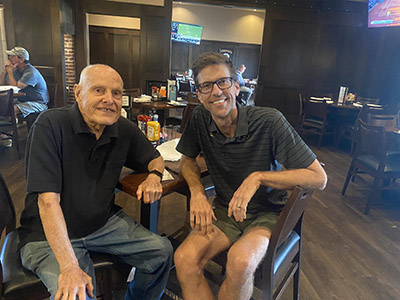
“When I was a freshman in high school, my District FFA speech was about Walt's work on the Purdue #1 genetically-superior Black Walnut seedlings. I won & went to state, owing my plaques to him. Our connection began then! I collected all of the work he did & studied what he did for years in high school & college. Little did I know, our paths would cross here in Greater Lafayette & we would be close friends for years.
“He truly, truly believed in me & everything I did. That meant so, so much to me. His passing has left a massive hole & gap in me. I could never talk to anyone about trees the way I could talk to Walt. We had many tree, plant & weather conversations over the years and I always, always looked forward to meeting with him. He would take me to his forest property called "The Land", show me his native plant nursery and we'd walk around his property. He truly was a brilliant, brilliant man and a guy I still look up to. You meet in your life those certain people you always remember and click with as friends and he was one of them. Tonight, think about those people in your life that truly made a difference. Walt truly made a difference in mine.”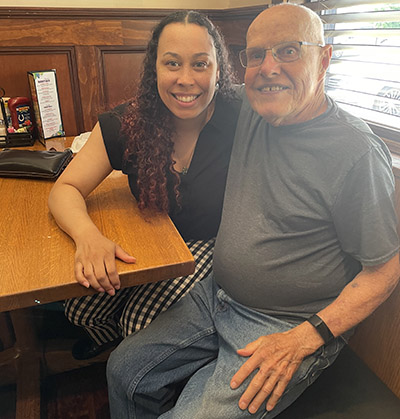
Dr. Shaneka Lawson, USDA Forest Service Research Plant Physiologist and FNR adjunct assistant professor
“Walt and I were lunch buddies that tried to meet once every month when the weather was nice. We also bred tomatoes together since we both had tomato gardens. He was always good for a laugh and there wasn’t a single day that he didn’t smile when we met. I will certainly miss him."
Liz Jackson, Executive Director for the Walnut Council and the Indiana Forestry and Woodland Owners Association
"Walt was always generous with his time and often attended events to speak and share his expertise. He clearly enjoyed spending time with landowners and “talking trees,” and everyone who attended enjoyed hearing from him. He was a passionate supporter of various forestry organizations in many ways."
Dr. Harvey Holt, FNR Professor Emeritus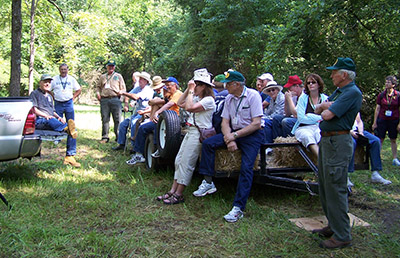
"Walt was very active in the Walnut Council. He gave a lot of presentations on the field tours about walnut culture, pruning, and genetics' influence on form. On one such tour somewhere in a walnut plantation, Walt did his usual discussion and noted how genetics played into the appearance of the tree. Someone in the audience pointed out that it was a pecan."
Jenny Groh, Indiana woodland owner
"Walt had an infectious smile and genuine laugh that I will always remember. He was a good person and helped make the world better. I’ll think of him as I observe the change of seasons through the native plants I bought from his nursery. I know Walt’s spirit will also be with his land and he’ll be happy to see his stewardship continue through NICHES."

